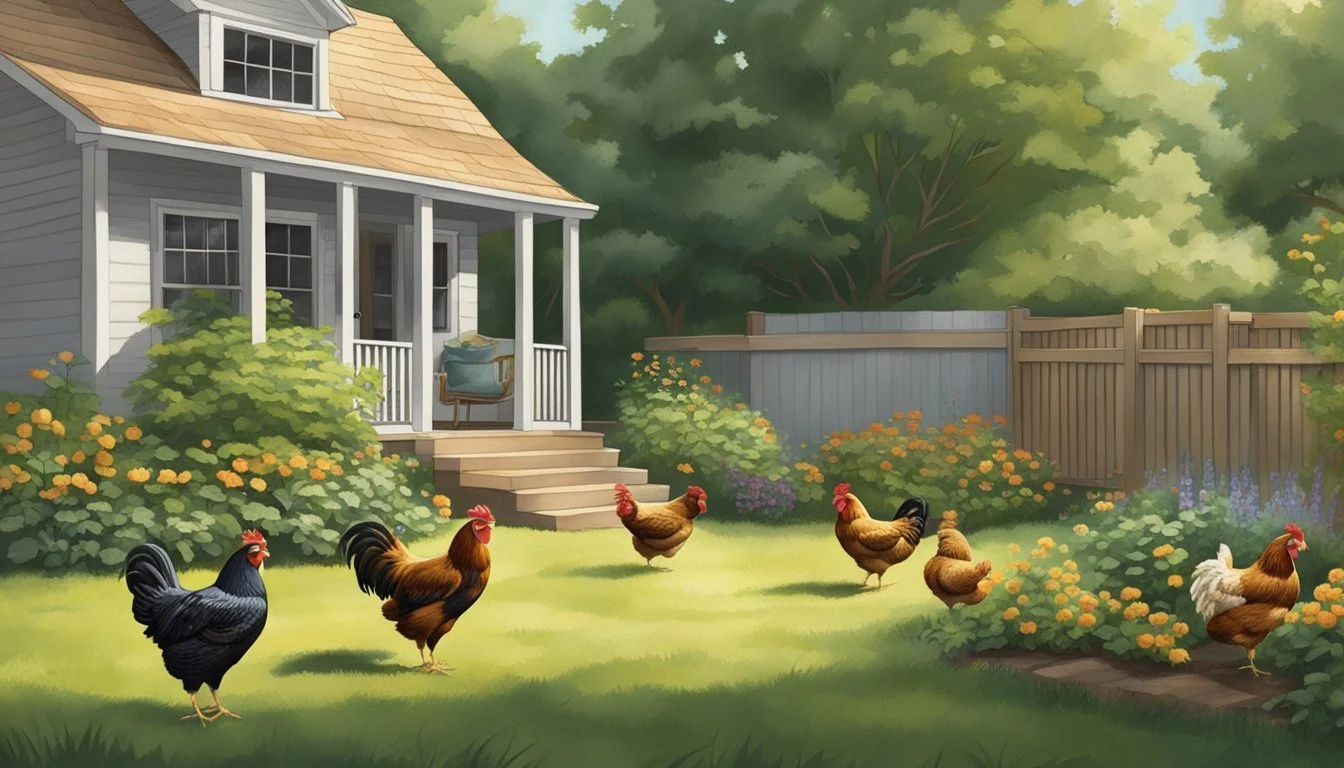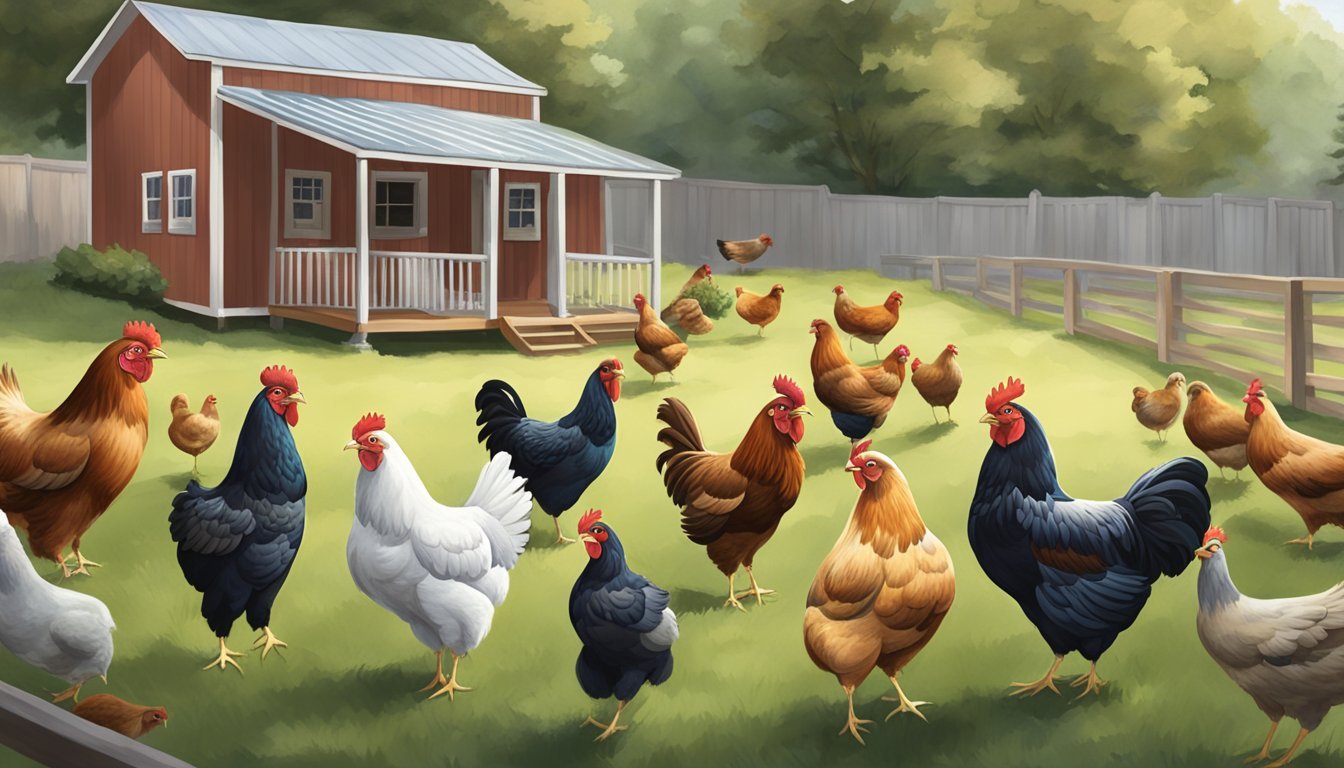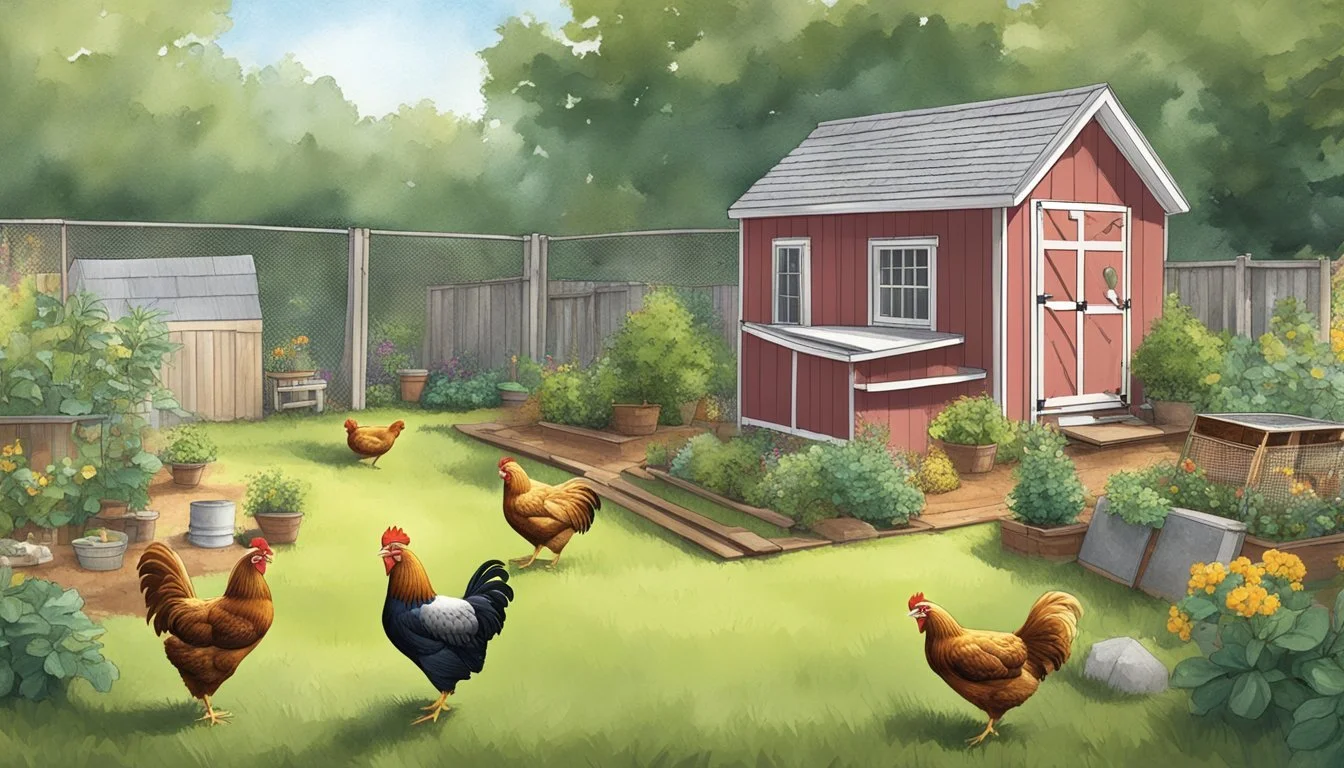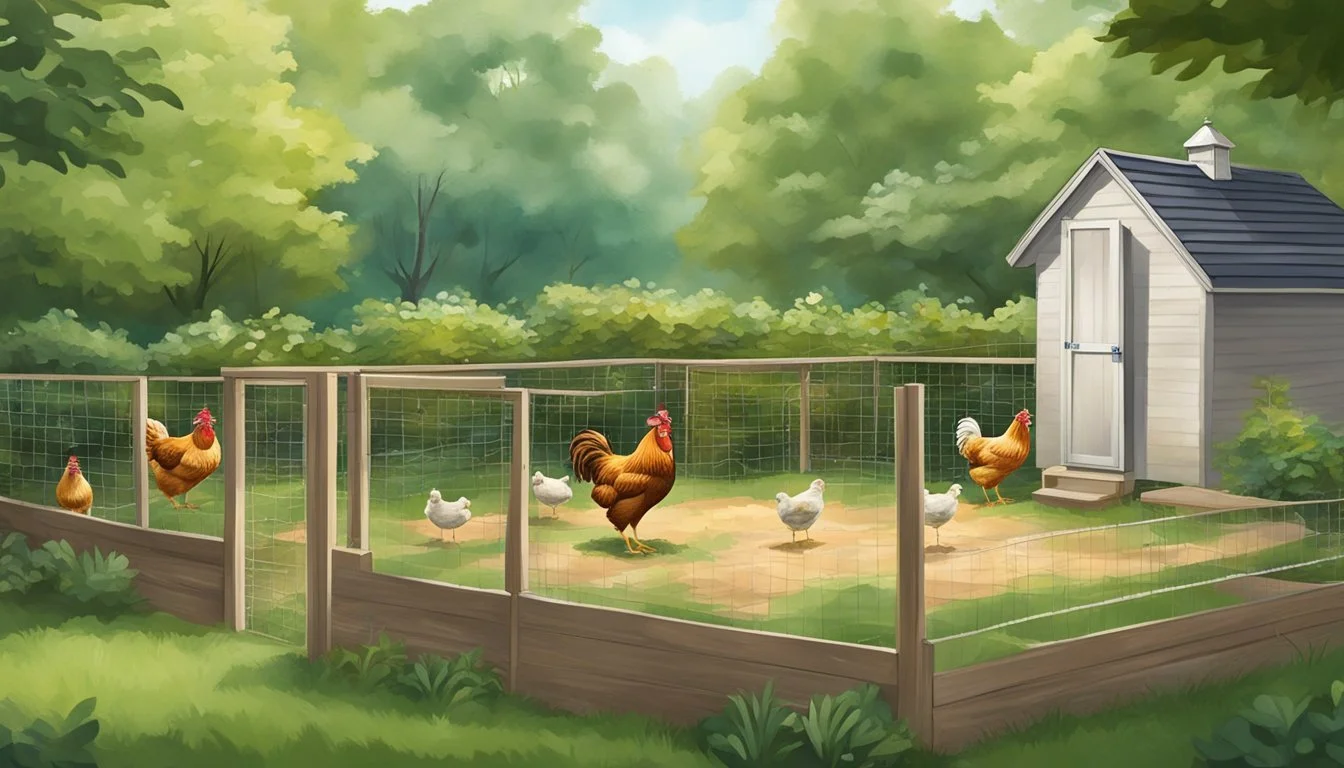Keeping Backyard Chickens in Raleigh, NC
A Beginner's Guide to Urban Poultry Farming
Keeping backyard chickens (how long does chicken last?) has become an increasingly popular practice for many residents of Raleigh, North Carolina, allowing for a sustainable lifestyle and the enjoyment of fresh eggs. The city of Raleigh permits its residents to have backyard flocks, though it's essential for prospective and current chicken keepers to adhere to local ordinances that are designed to maintain community standards and animal welfare.
Before starting a backyard flock in Raleigh, it's crucial to understand the city's specific requirements and limitations which are in place to ensure that chickens are kept in a humane, safe, and neighborly fashion. These rules include restrictions on the number of chickens, coop placement, and the prohibition of roosters due to noise considerations.
It's also worth noting that Raleigh prohibits the sale of baby poultry under six weeks old within city limits, which reflects a commitment to responsible pet ownership and the prevention of impulse buys. As with any animal care, prospective chicken owners should consider if they can provide daily fresh food, water, clean shelter, and the time necessary for gathering eggs and maintaining the coop. Adhering to these guidelines will help promote a positive experience for both the chickens and their keepers.
Legal Considerations for Raleigh Residents
Residents of Raleigh, North Carolina, who wish to keep backyard chickens must navigate an array of city ordinances and state laws. Understanding these rules is crucial to ensure lawful and responsible chicken ownership.
Understanding City Zoning and Ordinances
In Raleigh, zoning laws are key to determining whether residents can keep chickens on their property. The city's ordinances specify permissible areas and often restrict the types of birds and the number of chickens one can house. It's imperative for Raleigh residents to consult with the city zoning office to confirm that their property is zoned appropriately for keeping chickens. Moreover, chicken ordinances may have specific guidelines about coop placement, size, and the distance from neighboring homes to mitigate any nuisance.
Reach out to the Raleigh Zoning Office for personalized guidance.
Review local ordinances specific to chicken keeping.
County and State Regulations Overview
While city ordinances are specific to Raleigh, there are also broader county and state regulations that govern the ownership of backyard chickens in the area. These regulations can encompass health and safety standards, as well as welfare provisions, ensuring chickens have access to food, water, and safe roaming spaces. Residents must align with both Durham County and North Carolina state laws which can supersede local rules. Seeking information from the county's office can provide comprehensive details on any overarching chicken laws.
Verify compliance with both Durham County and NC state laws.
Understand broader chicken welfare regulations at the state level.
Choosing the Right Chicken Breed
When selecting chicken breeds for a Raleigh backyard, potential poultry keepers should prioritize local ordinance compliance, breed characteristics, and how well the breed adapts to the backyard environment.
Factors to Consider in Selecting Breeds
Before deciding on which chicken breeds to add to a backyard flock, Raleigh residents must understand the city's regulations regarding poultry. City ordinances may dictate the types of chickens allowed and whether roosters are permitted. Ensuring that the chosen breeds comply with local laws is essential.
In addition to regulatory compliance, breed characteristics warrant close attention. Potential keepers should assess:
Climate Tolerance: Some chickens are better suited to the North Carolina climate than others.
Temperament: A docile nature is preferable for limited spaces.
Purpose: Whether the breed is primarily for egg-laying, meat production, or show.
Space Requirements: Larger breeds may require more space.
Conservation Status: Heritage breeds, recognized by the American Livestock Breeds Conservancy, can contribute to genetic diversity and conservation efforts.
Popular Breeds for Raleigh Backyards
Certain breeds tend to be well-suited for backyard chicken flocks in Raleigh, North Carolina. Below is a list of popular breeds that align with typical backyard conditions and keeper preferences:
Rhode Island Reds: Known for their hardiness and prolific egg-laying abilities.
Plymouth Rocks (Barred Rocks): Adaptable and friendly, these birds are a common choice for their dual-purpose qualities.
Leghorns: Celebrated for their impressive egg production rates.
New Hampshires: A robust breed, similar to Rhode Island Reds, that is well-suited for meat and eggs.
Sussex: An easy-going breed with good egg-laying capabilities.
Wyandottes: They come in a variety of beautiful colors and have a calm disposition, which makes them suitable for smaller backyards.
These breeds are often recommended for urban and suburban settings due to their overall hardiness, compatibility with coexisting breeds, and suitability for smaller spaces often found in residential areas. Heritage breeds, such as the Dominique and Buff Orpington, are also options for those interested in preserving genetic diversity; they are recognized by conservation organizations like the American Livestock Breeds Conservancy.
Building and Managing Chicken Coops
When constructing a chicken coop in Raleigh, NC, attention to detail in both design and maintenance ensures the wellbeing of the chickens. Specific regulations must be adhered to for a successful and legal backyard setup.
Coop Design and Location
In Raleigh, homeowners must place their chicken coops in compliance with local zoning ordinances, which may include restrictions on distance from neighboring properties. Coop design should prioritize ample ventilation, with windows positioned for air circulation without causing drafts in colder weather. The size of the coop should accommodate the number of chickens, with a general rule of 3-4 square feet per bird inside the coop and 8-10 square feet per bird in the run.
For protection, a coop must provide shelter from predators with sturdy construction and secure latches. It's also important to place the coop in a location that has good drainage to avoid water accumulation, which can lead to health issues for the chickens.
Maintaining Cleanliness and Safety
Regular maintenance of a coop is crucial to prevent disease and pests. A cleaning schedule should include:
Daily: Remove food scraps and replace water.
Weekly: Change bedding and clean feeding and watering equipment.
Monthly: Inspect for and repair any damage to structure or fencing.
Ensuring the coop is clean also involves proper disposal of bedding and waste, conforming to city regulations to maintain hygiene and prevent attracting pests. Additionally, preventing contact between chickens and wild birds is important for disease control.
Safety is paramount, so homeowners should check local guidelines on the construction and positioning of coops and runs to protect backyard chickens effectively from both wildlife and domestic predators. Keeping the coop secure at night and when unattended is essential to safeguard against threats.
Daily Care and Feeding Practices
Maintaining a healthy backyard chicken flock in Raleigh, NC, hinges on consistent daily care and proper feeding practices. One must pay attention to the diet of their chickens and ensure they have continuous access to fresh water and a clean shelter.
Feeding Your Chickens
Chickens require a balanced diet to stay healthy and produce eggs. Feed should primarily consist of a commercial poultry pellet, which provides a complete nutritional profile necessary for their well-being. However, owners can supplement this diet with kitchen waste and garden trimmings. It's important to avoid giving chickens any toxic food scraps, like onion skins or avocado pits.
Here's a brief list of suitable kitchen scraps for chickens:
Cooked rice (how long does cooked rice last?) or pasta
Whole grains like wheat or barley
Vegetable peels (except onions and garlic)
Fruits (in moderation)
Feeding should occur at least once a day, with the amount depending on the size of the flock. Overfeeding can lead to obesity, while underfeeding affects egg production and overall health.
Ensuring Access to Water and Shelter
Water is vital for chickens, and they should have constant access to it. Water dispensers or troughs need daily checking to ensure the supply is clean and unfrozen, especially during colder months. In hot weather, water might need to be replenished more frequently to prevent dehydration.
Shelter is equally critical for a chicken's well-being. The coop must be dry and secure from predators, providing a refuge from weather extremes. Regular cleaning is required to prevent the build-up of waste and to keep the living area sanitary. Bedding material, such as straw or wood shavings, should be stirred daily to minimize moisture and odors and replaced when it becomes too soiled.
Health and Wellness of Backyard Chickens
Maintaining the health and wellness of backyard chickens in Raleigh, North Carolina, involves proactive measures and vigilant oversight. Chicken keepers must implement routine health practices and be adept at recognizing and treating illnesses.
Preventative Health Measures
Routine Care: Chickens require regular health checks to ensure they are free of parasites and signs of illness. This includes inspecting their feathers, eyes, beak, and feet. Vaccinations may be necessary to prevent common poultry diseases; consult with local veterinarians experienced in poultry health for the appropriate vaccination schedule.
Sanitation: Clean the coop regularly to prevent disease. Remove waste and change bedding often to maintain a hygienic environment.
Nutrition: Provide chickens with a balanced diet suitable for their age and egg production status. Fresh water should be available at all times.
Biosecurity: Limit visitors to your flock and enforce a sanitation protocol for those who do come into contact with your chickens.
Identifying and Addressing Illness
Signs of Illness: Lethargy, decreased appetite, abnormal droppings, respiratory distress, and changes in egg production can indicate illness. Be observant for any changes in behavior or appearance.
Quarantine: Isolate any chicken showing signs of disease immediately to prevent the spread to healthy birds.
Consultation with Veterinarians: It's crucial to establish a relationship with a veterinarian knowledgeable in avian medicine. They can provide advice, diagnose conditions, and prescribe treatments to manage health issues.
Record Keeping: Maintain detailed health records for each chicken to track any treatment and monitor recovery effectively.
Egg Production and Consumption
In Raleigh, North Carolina, residents keeping backyard chickens can expect their hens to be productive layers, supplying an ample amount of eggs for household consumption. Understanding how to maximize egg yield and handle eggs safely is essential for any backyard flock owner.
Maximizing Egg Yield
Genetics and Breed: Select breeds known for their high egg production, such as the Leghorn or Rhode Island Red.
Optimal Nutrition: Provide a balanced feed specifically formulated for laying hens, which typically includes higher levels of calcium and protein.
Proper Lighting: Hens require about 14-16 hours of light per day to maintain optimal laying conditions. In the shorter daylight months, consider using artificial lighting.
Stress Reduction: Keep the environment calm and avoid disturbances to prevent stress, which can negatively affect egg production.
Regular Health Checks: Monitor flock health regularly to prevent diseases that can impact egg-laying performance.
Maintaining a consistent routine and providing proper care are the keys to maximizing egg production for backyard flocks in Raleigh.
Handling and Using Flock Eggs Safely
Collection Frequency: Collect eggs at least once a day to ensure they are clean and to reduce the chance of breakage.
Cleaning Eggs: Eggs should be wiped with a dry cloth or sandpaper if needed. Avoid washing with cold water as it can pull bacteria into the egg.
Storage: Store eggs at a consistent, cool temperature, typically in the refrigerator, to preserve their freshness.
Fertility Check: If roosters are present, eggs may be fertile; handle with care if incubation for hatching is not intended.
Proper handling and storage of eggs ensure they remain safe for consumption and maintain their high-quality status, providing Raleigh families with a reliable source of nutrition.
Garden Integration and Organic Waste Management
Integrating chickens into your garden can significantly boost soil fertility while contributing to a sustainable ecosystem. By effectively utilizing chicken litter and understanding the chickens' role in the ecosystem, gardeners in Raleigh, NC can create a harmonious backyard garden space.
Using Chicken Manure in the Garden
Chicken manure is high in nitrogen, an essential nutrient for plant growth. It must be composted before use in the garden to avoid damaging plants with excess ammonia or pathogens. A proper composting process, which takes about six months, transforms raw manure into organic fertilizer that can significantly enhance soil health.
Collect manure and bedding material.
Balance with carbon-rich materials (leaves, straw).
Turn the pile regularly to aerate.
Monitor for a steady temperature (about 130°F–150°F).
Cure composted manure for an additional 1-2 months before applying to the garden.
Once properly composted, manure can be safely mixed into the soil, improving nutrient content and moisture retention. It is ideal to apply composted manure in fall or early spring to prepare beds for planting.
Chickens as Part of a Sustainable Backyard Ecosystem
Chickens contribute to pest management by foraging for insects, which can reduce the need for chemical pest controls. Having backyard garden chickens creates a symbiotic relationship between the garden and the fowl, where chickens provide litter that becomes organic fertilizer, and gardens offer a natural foraging space.
Benefits of Chickens in the Garden:
Natural pest control: Chickens eat a variety of garden pests.
Soil aeration: Their scratching helps aerate the soil.
Fertilization: Litter is a source of organic fertilizers once composted.
Waste reduction: Kitchen scraps can be fed to chickens, reducing waste.
Note: It is crucial to balance the chicken's access to the garden, ensuring they do not damage young plants or vegetable beds. Proper fencing or supervised foraging times can mitigate any potential harm to the garden plants.
Community Relationships and Managing Noise
Keeping backyard chickens requires consideration of both community relationships and noise management. Engaging positively with neighbors and understanding how to control chicken noises are essential components of urban poultry keeping.
Communicating with Neighbors
Successful chicken keeping in an urban environment like Raleigh, NC, often starts with transparent communication with neighbors. It is imperative that chicken owners initiate conversations about their intentions to keep chickens, addressing any concerns and describing the measures they will take to manage noise and maintain cleanliness. Offering to share fresh eggs can foster goodwill.
Be proactive: Reach out to neighbors before acquiring chickens.
Share information: Provide details on the number of hens and the absence of roosters to alleviate noise concerns.
Set expectations: Discuss coop location, maintenance plans, and how you'll handle potential noise issues.
Understanding and Controlling Chicken Noises
Chickens make various noises during the day, but hens typically create less commotion than roosters. Noise concerns are a primary reason why many urban areas, including Raleigh, are more permissive of hens than roosters. Roosters are known for their early morning crowing, which can be disruptive. Thus, keeping roosters within city limits may be regulated or restricted.
Types of noises: Hens cluck especially when laying eggs, but their sounds are less intrusive than crowing.
Noise reduction strategies:
Design the coop to muffle sounds.
Position the coop away from property lines.
Consider keeping a smaller flock.
City ordinances: Understand and comply with local noise regulations to avoid conflicts.
By maintaining open communication with neighbors and effectively managing chicken-related noises, backyard chicken enthusiasts in Raleigh can enjoy their hobby while upholding community harmony.
Responsible Flock Management
Maintaining a healthy and happy flock in a backyard setting requires understanding bird integration and what to do with surplus birds or roosters. Careful consideration must be given to flock dynamics and ethical rehoming practices.
Integrating New Birds and Flock Dynamics
When adding day-old chicks or pullets to an existing flock, it's crucial to ensure a smooth integration process. This requires quarantine for new birds before introduction to avoid disease spread. Once ensuring the health of new birds, they should be introduced gradually to the established flock to minimize stress and aggression.
Day-Old Chicks:
Secure a separate brooding area
Maintain warm temperature (95°F for first week, reduce by 5°F weekly)
Provide age-appropriate feed
Pullets & Mature Hens:
Isolate for at least 30 days
Observe for signs of disease
Introduce to the flock in a neutral space
Observing the flock's behavior during integration allows for intervention if necessary to prevent injury to the newcomers or existing members.
Dealing with Unwanted Roosters and Surplus Birds
Unwanted roosters and surplus birds can arise even in the best-planned flocks. It's essential to manage these situations humanely and responsibly:
Unwanted Roosters:
Explore rehoming options through local farming groups or poultry enthusiasts
Ensure it's a safe and suitable environment for the rooster
Surplus Birds:
Advertise to local backyard chicken keepers
Contact agricultural extensions or poultry clubs for responsible rehoming practices
Ethical management of surplus birds includes not releasing them into the wild, as this can be harmful to both the chickens and the local ecosystem.
Educational Resources and Local Support
When deciding to keep backyard chickens in Raleigh, North Carolina, residents have a robust framework of educational resources and local support networks to ensure the success and compliance of their poultry endeavors.
NC State Extension and Urban Agriculture Programs
NC State Extension offers extensive guidance on keeping garden chickens through its online resources. They provide materials on various topics including:
Starting a Backyard Flock: Essential considerations for beginners
Management Practices: Best practices for poultry care and maintenance
Urban Agriculture Programs in Raleigh also bolster the community's knowledge by hosting workshops and events aimed at educating aspiring and current chicken owners on sustainable urban agriculture.
Local Experts and Animal Control Liaison
Residents can connect with Area Specialized Agents and Livestock Agents through the NC State Extension for tailored advice on poultry care. These experts offer insights based on the latest research and can help troubleshoot issues specific to the Raleigh area.
Animal Control liaisons are available to ensure that local ordinances are understood and followed. They serve as a bridge between the community and regulatory aspects, providing clarifications and assistance on compliance matters.
Moreover, collaborations with the Virginia Cooperative Extension provide an opportunity for cross-state knowledge-sharing, offering a broader perspective on backyard poultry management which can be beneficial for North Carolinians.
Additional Considerations for Raleigh Chicken Keepers
When tending to backyard chicken flocks in Raleigh, NC, there are several aspects to consider to ensure the well-being and productivity of the chickens.
Lighting: Proper lighting is crucial for managing laying hens, as it influences their laying cycles. Keepers should provide a naturally lit environment that replicates the length of the day, occasionally supplemented with artificial light, if needed, for consistent egg production.
Nutrition: A balanced diet is key to chicken health. Feed should include:
A high-quality commercial poultry feed
Access to clean, fresh water at all times
Occasional treats like vegetables and fruit in moderation
Housing and Security: A predator-proof coop is mandatory to safeguard chickens from urban predators.
The coop must be sturdy and lockable
Nesting boxes and perches should be provided
Healthcare: Regular check-ups and prompt treatment of any ailments help maintain flock health. Be aware of common poultry diseases and how to manage them.
Lastly, Raleigh residents must remain compliant with local ordinances, ensuring the flock does not become a nuisance. A successful backyard chicken keeper balances the needs of their chickens with the responsibilities to their community.













